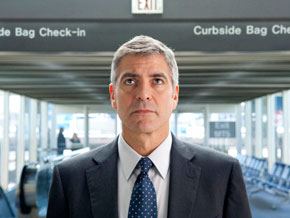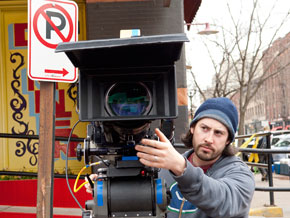Flying High with Jason Reitman

In Up in the Air, George Clooney plays Ryan Bingham, a man who travels 322 days a year for his job as a corporate downsizer. (That's the polite way of saying he fires people for a living.) He's passionate about his solitary way of life, until an eager young colleague and a beautiful woman turn his idea of happiness upside down. Just days before his Golden Globe nomination for the film, we chatted with Jason Reitman about his own passion for air travel, the common thread between all his main characters and how the sinking economy changed his film.
Rachel Bertsche: Ryan Bingham is so passionate about air travel, or "air world" as Up in the Air author Walter Kirn called it. That's so true of frequent travelers, and we all know someone like Ryan. My own brother travels a ton for work and really prides himself on his knowledge about flying and, like Ryan, is totally judgmental of amateur fliers. What is it about the air community that makes them have such strong feelings about something that so many regular people really hate doing? These days so many people hate traveling. Jason Reitman: I think it's a combination of things. One, it's the thing that you first brought up—it is a community. If you look at a website like FlyerTalk.com, for example, you will find a group of people who have banded together in their passion for this kind of lifestyle of living continuously on the road and who have an unusual definition of the word home. It's a group of people that are just as comfortable if not more comfortable living in constant flux—hotel to hotel, airport to airport—who get a sense of thrill from being surrounded by those destination boards knowing that they could suddenly be off to any city in the world. People who live by their daily itinerary. And I think one of the reasons they have this not only passion, but indignation, is that there's been enough movies like Planes, Trains and Automobiles, there's been enough news pieces and articles on the frustrations of travels. It's an easy enough conversation point, so if you love travel then you angrily defend it. It's funny, we just had this contest online about what your favorite travel tips are, and tips came in one of two fashions. Either it was people who don't travel a lot putting up a tip about how to be more courteous, and being more courteous is the first sign that you are not a traveler. And then for the people who do travel a lot, the tips were, like, if you are not a real traveler why are you in the expert travel line? They have an expression called "gate lice," and that is for people without status that are hanging out near the entrance to the jetway unaware that they are blocking the way for first-class passengers and, more importantly, passengers with high status that need to get through. There's a strange sort of democracy that anyone can rise to the level of elite in air travel, anyone can earn their miles and show their loyalty and end up with a high level of status, and they don't want to be left with the riffraff.
RB: I loved the part where Ryan explains to his co-worker who you should and shouldn't get behind in line when you're going through security.
JR: Yeah, I would add to that list that you should not get behind people who wear belts. People with belts have no sense of urgency; they just do not care apparently what time they arrive.

RB: Up in the Air is the first film ever to shoot with the real TSA, and you shot some of the film on real American Airlines planes. So many films can get away with staging a metal detector and a plane and a conveyor belt—why was it so important to have that authenticity for this film?
JR: Well, this is my love letter to travel, so I want it to be as authentic as humanly possible. We were just fortunate in that American Airlines was a great partner and they got us into a lot of places we normally wouldn't. Not only into TSA security, but four international airports all over the world. They flew in a 757 so we could shoot on it, and because of that I think there is a level of detail in the methodology of travel in this film that no other film has.
RB: Well, I personally am grateful to you for pointing out that checking a bag adds 35 minutes to a flight, because I am very strict about carrying on. I will not let anyone I fly with check a bag.
JR: Thank you! There's just no reason. I just did many weeks on the road, and there was one block that was two weeks long and I did it all out of rollaway. As long as you have a place to wash underwear every once in a while you're fine. Every time you check a bag you're playing some sort of dangerous lottery. Best-case scenario, you're wasting a half hour, but I can't put my destiny in somebody else's control like that.
JR: Well, this is my love letter to travel, so I want it to be as authentic as humanly possible. We were just fortunate in that American Airlines was a great partner and they got us into a lot of places we normally wouldn't. Not only into TSA security, but four international airports all over the world. They flew in a 757 so we could shoot on it, and because of that I think there is a level of detail in the methodology of travel in this film that no other film has.
RB: Well, I personally am grateful to you for pointing out that checking a bag adds 35 minutes to a flight, because I am very strict about carrying on. I will not let anyone I fly with check a bag.
JR: Thank you! There's just no reason. I just did many weeks on the road, and there was one block that was two weeks long and I did it all out of rollaway. As long as you have a place to wash underwear every once in a while you're fine. Every time you check a bag you're playing some sort of dangerous lottery. Best-case scenario, you're wasting a half hour, but I can't put my destiny in somebody else's control like that.

RB: The book Up in the Air, by Walter Kirn, was written before 9/11 changed air travel. The movie was now, when we look at traveling and airport security completely differently. Did you have to make adjustments for that?
JR: Not really. The biggest change in post-9/11 travel is that how you go through security is more detailed—you have to take off your shoes, you can only carry liquids in the 3 ounces, things like that—and then once you're on the flight you just don't see the pilot anymore. Now when the pilot has to step out they put up this wire gate and stand there on watch, and you see him for two seconds as he slips into the washroom. But otherwise, travel for the most part is the same. It's not as if we all used to carry guns on planes. It's not like things changed that drastically in terms of general travel. I at least haven't felt that it was that different.
RB: The three films you've made, Thank You for Smoking, Juno and Up in the Air, are all pretty similar in that they have really interesting flawed-but-likable characters that really anchor the story. What type of films or characters are you generally attracted to? What is the common thread between Juno and Ryan and Nick Naylor?
JR: Well, I suppose all three of my main characters have a very open-minded point of view on a political issue that is otherwise divisive and polarizing. Nick Naylor's point of view on cigarette culture, Juno's point of view on being pregnant and Ryan's point of view on the concept of being alone in the universe are issues that people, for whatever reason, have very specific and loud points of view on.
JR: Not really. The biggest change in post-9/11 travel is that how you go through security is more detailed—you have to take off your shoes, you can only carry liquids in the 3 ounces, things like that—and then once you're on the flight you just don't see the pilot anymore. Now when the pilot has to step out they put up this wire gate and stand there on watch, and you see him for two seconds as he slips into the washroom. But otherwise, travel for the most part is the same. It's not as if we all used to carry guns on planes. It's not like things changed that drastically in terms of general travel. I at least haven't felt that it was that different.
RB: The three films you've made, Thank You for Smoking, Juno and Up in the Air, are all pretty similar in that they have really interesting flawed-but-likable characters that really anchor the story. What type of films or characters are you generally attracted to? What is the common thread between Juno and Ryan and Nick Naylor?
JR: Well, I suppose all three of my main characters have a very open-minded point of view on a political issue that is otherwise divisive and polarizing. Nick Naylor's point of view on cigarette culture, Juno's point of view on being pregnant and Ryan's point of view on the concept of being alone in the universe are issues that people, for whatever reason, have very specific and loud points of view on.

RB: George Clooney is fantastic in this film, as always. Also fantastic, though, are Anna Kendrick and Vera Farmiga, the two supporting roles. They both seem so real. How did you write and direct these women so well?
JR: I wanted to look at the idea of female midlife crisis and explore it through one woman shown at two different ages. The age of Vera's character is a woman in her late 30s, about to turn 40, and Anna Kendrick is a young girl who's right out of college, 23. I wanted to somehow explore the identity crisis that I feel a lot of career women I know go through in their late 30s—or just their 30s in general—and then also show the girl in her early 20s who thinks she knows everything as she gets out of college and looks to the world. Then she meets Alex and starts getting the inkling that things aren't what she thought, and it's a little scary and she would never ever admit it, but she's kind of terrified about becoming the women that she knows she will become.
RB: Do you think your film will get a different perception now than you had originally envisioned due to how many people now can relate to the getting laid off aspect?
JR: Well, certainly the film has more gravity because of the layoffs. Ryan's job, which used to be kind of a side note in the script, has become more of a focal point in how people discuss the film. I hope that it just makes it a movie of the moment. I hope that it makes it a defining movie of what it was like to live in 2009.
JR: I wanted to look at the idea of female midlife crisis and explore it through one woman shown at two different ages. The age of Vera's character is a woman in her late 30s, about to turn 40, and Anna Kendrick is a young girl who's right out of college, 23. I wanted to somehow explore the identity crisis that I feel a lot of career women I know go through in their late 30s—or just their 30s in general—and then also show the girl in her early 20s who thinks she knows everything as she gets out of college and looks to the world. Then she meets Alex and starts getting the inkling that things aren't what she thought, and it's a little scary and she would never ever admit it, but she's kind of terrified about becoming the women that she knows she will become.
RB: Do you think your film will get a different perception now than you had originally envisioned due to how many people now can relate to the getting laid off aspect?
JR: Well, certainly the film has more gravity because of the layoffs. Ryan's job, which used to be kind of a side note in the script, has become more of a focal point in how people discuss the film. I hope that it just makes it a movie of the moment. I hope that it makes it a defining movie of what it was like to live in 2009.
RB: Do you worry that people will like Ryan less because they have been in that seat across from him?
JR: No, just because that's not what the movie's about at the end of the day. It's not as if either the filmmaker or the character are taking a moral viewpoint on the firing. It's not about that at the end of the day.
RB: So, at the end of the day, what would you say it is about?
JR: Well, the movie is about a guy who's sort of figuring out who and what he wants in his life. That's how it kind of begins, middles and ends—if I can use middles as a verb. It's about a guy whose core life philosophy is that life would be better somehow without anything or anybody and then is challenged by his family, by Alex played by Vera Farmiga and Natalie played by Anna Kendrick. It is through reconnecting with his family, reconnecting with a women romantically and becoming oddly a surrogate father to Natalie that he recognizes the value of companionship.
RB: There has been a lot of awards buzz around the film. Do you pay attention to that or do you tune it out? Is it even possible to tune it out?
JR: If we were so fortunate as to receive that kind of recognition it would be incredibly flattering and, more importantly, it would bring more attention to this film, which is at the end of the day what I am most after.
JR: No, just because that's not what the movie's about at the end of the day. It's not as if either the filmmaker or the character are taking a moral viewpoint on the firing. It's not about that at the end of the day.
RB: So, at the end of the day, what would you say it is about?
JR: Well, the movie is about a guy who's sort of figuring out who and what he wants in his life. That's how it kind of begins, middles and ends—if I can use middles as a verb. It's about a guy whose core life philosophy is that life would be better somehow without anything or anybody and then is challenged by his family, by Alex played by Vera Farmiga and Natalie played by Anna Kendrick. It is through reconnecting with his family, reconnecting with a women romantically and becoming oddly a surrogate father to Natalie that he recognizes the value of companionship.
RB: There has been a lot of awards buzz around the film. Do you pay attention to that or do you tune it out? Is it even possible to tune it out?
JR: If we were so fortunate as to receive that kind of recognition it would be incredibly flattering and, more importantly, it would bring more attention to this film, which is at the end of the day what I am most after.
Keep Reading






